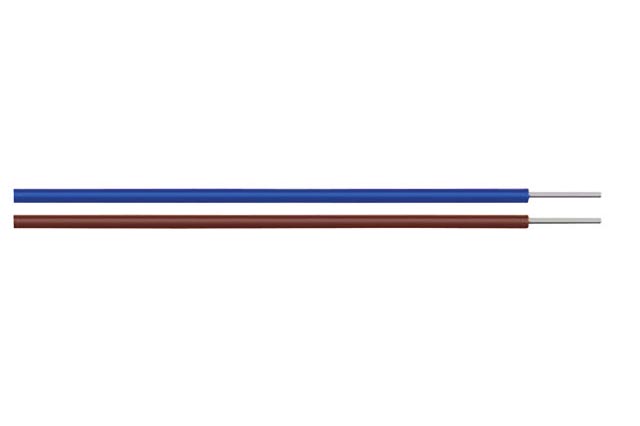PTFE Insulated hookup wire

PTFE hookup wire
PTFE Hook Up Wire is a single ptfe insulated conductor wire that may be used for low voltage, low current applications. The lead wire is frequently used in control panels, internal wiring of computers, electronic equipment, automotives, meters, ovens, and appliances.
PTFE Insulated Hookup Wire is a crucial component in various industries due to its unique properties and benefits. This article provides an in-depth exploration of PTFE insulation, covering its history, development, properties, and applications. By examining the advantages of PTFE insulation and comparing it to other types of insulation materials, readers will gain a comprehensive understanding of why PTFE insulated hookup wire is chosen for specific applications. Additionally, considerations for selecting PTFE insulated wire, maintenance tips, and insights into future trends and innovations in PTFE insulation technology will be discussed to provide a holistic view of this essential electrical component.
Introduction to PTFE Insulated Hookup Wire
Overview of PTFE Insulation
PTFE insulation, short for polytetrafluoroethylene (try saying that five times fast), is like the superhero cape of hookup wires. It boasts impressive properties that make it a top choice for demanding applications.
History and Development of PTFE Insulated Wire
Imagine a world without PTFE insulated wires — sounds like a nightmare, right? Thankfully, this wonder material has been around for decades, evolving to meet the ever-growing needs of various industries.
Properties and Benefits of PTFE Insulation
High Temperature Resistance
PTFE insulation laughs in the face of scorching temperatures. It can handle heat like a boss, maintaining its cool even when things get seriously hot under the collar.
Chemical and Moisture Resistance
Spills, splashes, and chemical attacks? No problem for PTFE insulation. This stuff is like Teflon for your wires, keeping them safe from corrosive substances and moisture.
Low Dielectric Constant and Loss Tangent
Forget the techno-jargon — just know that PTFE insulation is a champ at maintaining signal integrity, ensuring your data travels from point A to point B without getting lost in translation.
Applications and Industries Using PTFE Insulated Hookup Wire
Aerospace and Defense
When it comes to critical missions and top-secret projects, aerospace and defense rely on PTFE insulated hookup wire to keep communication lines clear and interference-free.
Medical Devices
In the world of medicine, precision and reliability are non-negotiable. That’s why medical devices entrust PTFE insulated wires to deliver accurate signals and power without missing a heartbeat.
Telecommunications
From your smartphone to the vast network of communication towers, PTFE insulated hookup wires play a vital role in keeping us all connected, making sure your cat videos reach your friends in record time.
Comparison with Other Types of Insulation Materials
Silicone Insulation
Silicone insulation may be trendy, but when it comes to high temperatures and chemical resistance, PTFE takes the crown and wears it with style.
PVC Insulation
PVC insulation is like the reliable sidekick of the wire world, but PTFE steals the show with its superior performance in extreme conditions and signal fidelity.
Rubber Insulation
Rubber insulation is great for some applications, but PTFE’s exceptional properties make it the go-to choice where durability and performance are non-negotiable.
Considerations for Selecting PTFE Insulated Hookup Wire
Temperature Requirements
When choosing PTFE insulated hookup wire, consider the temperature environment it will be exposed to. PTFE is known for its exceptional heat resistance, making it ideal for high-temperature applications where traditional wire insulation may degrade.
Flexibility and Durability
PTFE insulated wire offers a balance of flexibility and durability. It can withstand bending and twisting without losing its insulating properties, making it suitable for applications where the wire may experience movement or vibration.
Cost Considerations
While PTFE insulated wire may have a higher upfront cost compared to other types of wire, its longevity and reliability often make it a cost-effective choice in the long run. Consider the overall lifecycle cost and potential savings in maintenance and replacement when evaluating the initial investment.
Maintenance and Handling of PTFE Insulated Wire
Proper Installation Techniques
To ensure optimal performance, follow recommended installation techniques for PTFE insulated wire. Proper stripping, termination, and routing can help prevent damage and maintain the wire's integrity over time.
Cleaning and Maintenance Tips
PTFE insulation is resistant to contaminants and moisture, making it relatively low maintenance. Regular inspections for wear or damage, and periodic cleaning with a mild solvent if needed, can help prolong the lifespan of PTFE insulated hookup wire.
Future Trends and Innovations in PTFE Insulation Technology
Nanotechnology Applications
As technology advances, nanotechnology is being increasingly utilized in PTFE insulation to enhance its performance characteristics. Nanomaterials can improve insulation properties, reduce wire size, and even enable new functionalities in PTFE insulated wire.
Enhanced Thermal Conductivity Developments
Future innovations in PTFE insulation technology are focusing on improving thermal conductivity. By enhancing heat dissipation properties, PTFE insulated wire can be used in a wider range of high-temperature applications, opening up new possibilities for its use in various industries. In conclusion, PTFE Insulated Hookup Wire continues to play a vital role in various industries, offering unparalleled performance and reliability. As technology advances and innovations in PTFE insulation continue to emerge, it is clear that this versatile material will remain a key choice for demanding applications. By understanding the properties, applications, and considerations associated with PTFE insulated wire, professionals can make informed decisions when selecting the best wiring solution for their specific needs. Stay tuned for future developments in PTFE insulation technology as it continues to shape the electrical industry.